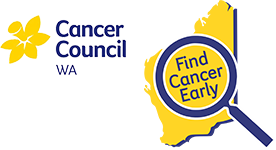Cancer Council and Regional Men’s Health team up to tell men: don’t ignore your prostate until it’s too late.
The main risk factor for developing prostate cancer is getting older.
This article was published by Eliza Wynn in Avon Valley and Wheatbelt Advocate on 17 September 2018.
Cancer Council WA and The Regional Men’s Health Initiative are using Prostate Cancer Awareness month to issue a timely reminder to blokes in regional WA to take action on any problems affecting them below the belt.
Cancer Council WA regional education officer Melissa Pickering and Regional Men’s Health community educator Terry Melrose met recently to discuss measures to raise awareness around prostate cancer.
Ms Pickering said along with being a man there were a number of risk factors associated with prostate cancer including age, family history, race and diet to consider.
“The main risk factor for developing prostate cancer is getting older,” she said.
“Prostate cancer is rare in men under 50 years of age. If your father or brother was diagnosed with prostate cancer at a young age or you have a strong family history of breast cancer your chances of developing prostate cancer are increased. Prostate cancer is more common in people of African descent.
“Despite considerable research examining the link between diet, alcohol or physical activity and prostate cancer, we are not able to say with any certainty if there is anything a man can do to reduce his risk of prostate cancer. However, there are however plenty of other reasons to eat a diet rich in fruit and vegetables, be physically active and avoid alcohol.”
Prostate cancer is the most common cancer affecting men in Western Australia.
In 2014, 1945 WA men were diagnosed with prostate cancer, in the same year 231 Western Australian men died from prostate cancer.
“The chances of getting prostate cancer by the time you’re 75 is one in eight,” said Ms Pickering.
“This means for every eight people one person will get prostate cancer.”
Mr Melrose said although the discussion can be seen as awkward, getting your prostate checked is important.
“Men from regional WA can be hesitant to attend the doctors at the best of time let alone to discuss problems below the belt,” he said.
Information on prostate cancer, early detection and prevention is available from The Men’s Health Initiative at 75 York Road Northam or call Cancer Council WA 13 11 20.
